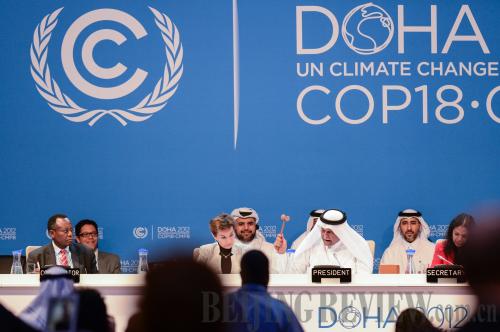|
 |
|
SEALING THE DEAL: Abdullah Bin Hamad Al-Attiyah (second right), President of the Doha climate change conference, announces the agreement reached at the conference on December 8 (LI MUZI) |
The Kyoto Protocol has been extended by eight years and will come into effect as of January 1, 2013. That's where the good news ends following the conclusion of lengthy negotiations at the UN Climate Change Conference in Doha, Qatar, which wrapped up on the night of December 8.
The modest outcome saved the Doha conference from being labeled a complete failure.
The conference has met China's expectations, but the main barriers of future actions by the international community to cope with climate change still remain, said Xie Zhenhua, Vice Minister of the National Development and Reform Commission and head of the Chinese delegation to the UN climate conference.
At the meeting, developed countries downplayed their historical responsibilities and the principle of "common but differentiated responsibilities" and displayed a lack of political will in emission reduction, financial support and technology transfers, said Xie.
Civil society organizations are unanimously dissatisfied.
The UN climate talks failed to deliver increased cuts to carbon pollution, nor did they provide any credible pathway to providing $100 billion per year in financing by 2020 to help the poorest countries deal with climate change, according to the Climate Action Network-International (CAN-I), a worldwide body of 700 non-governmental organizations.
"The Doha decision has delivered no real cuts in emissions and it has delivered no concrete finance," said Tasneem Essop, head of the World Wide Fund for Nature (WWF) delegation.
The agreement reached after two weeks of grueling negotiations in Doha has sent some encouraging signals.
The Kyoto Protocol, the only binding agreement under which developed countries commit to cutting greenhouse gases, has been extended and its second commitment period will continue from next year. Participants include the EU, Australia, Switzerland and other industrialized countries.
Also, the EU, Australia, Japan, Liechtenstein, Monaco and Switzerland have declared that they will not carry over any surplus emission trading credits into the second commitment period. The issue of excess emission allowances, totaling 13 billion tons in greenhouse gases, was one of the most contentious topics at the Doha climate talks. Allowing the carryover of excess emission permits were strongly opposed by many countries, because the carryover may lead to a decrease of greenhouse gas levels only on paper, not in the atmosphere.
The agreement encourages developed countries to increase efforts to provide financing between 2013 and 2015 to at least the average annual level with which they provided fast-start funding from 2010-12. Germany, the UK, France, Denmark, Sweden and the EU Commission announced concrete financing pledges for the period up to 2015, totaling approximately $6 billion.
Meanwhile, the Doha conference agreed on a timetable to adopt a universal climate agreement by 2015 and a path to raise the willpower necessary for responding to climate change.
The Doha agreement also endorses the completion of new institutions to channel funding and technology to developing countries. South Korea was selected as the location of the Green Climate Fund, which is expected to start its work in Songdo in the second half of 2013. It also confirms a consortium led by the UN Environmental Programme as host of the Climate Technology Center, for an initial term of five years.
Although the second commitment period of the Kyoto Protocol was adopted in Doha, participating countries set their emission reduction target at only 18 percent. According to the Intergovernmental Panel on Climate Change's Fourth Assessment Report in 2007, developed economies as a group will have to reduce emissions by 25-40 percent from 1990 levels to keep temperature rises within an acceptable range.
| 